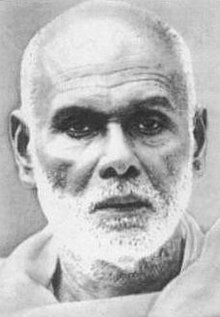Narayana Guru
Appearance

Narayana Guru (August 28, 1855 – September 20, 1928) was a spiritual Sage and social reformer of India.
Quotes
[edit]- One caste, one religion, one God for man. Whatever be the religion, it is enough if the man is good.
- One in kind, One in Faith and One in God Of one same womb, of one same form there is no Difference at all.
- Whatever be the difference in people’s caste, creed, language and religion, since they are from the same creation, there is no harm in their dining together and marrying each other.
- Mother is the first Guru to a child. Then comes father. Later, he who gives knowledge is the Guru. After that comes the Guru who teaches the secret of a good life and of true happiness. Last of all, when wisdom comes, one is a Guru unto oneself.
- Arun Shourie tells us that a lot can be learned from the case of Narayan Guru who, early this century, as a member of the unapproachable Ezhava caste in Kerala, became an acknowledged religious leader and profoundly changed caste relations in Kerala for the better. He 'attained the highest spiritual states, thereby acquired unquestioned authority, and transformed society from within the tradition'. He made use of a major loophole in the rigidities of the caste system, a loophole which Hindu society deliberately maintained precisely because Hinduism was not merely a social system but, among other things, also a spiritual system: renunciates in general, and sages with acknowledged yogic realization in particular, are above the worldly divisions such as caste. They also have the authority to herald social transformations which Hindus would never accept from purely political busybodies.
- Elst, Koenraad (2002). Who is a Hindu?: Hindu revivalist views of Animism, Buddhism, Sikhism, and other offshoots of Hinduism. ISBN 978-8185990743
- Earlier one of the greatest of reformers of the last hundred and fifty years had adopted the exact opposite course, and thereby accomplished both— he had lifted the lives of millions, and at the same time he had transformed and raised our society. That reformer was from a caste which was not just untouchable but unapproachable— the reformer of course was Narayan Guru, who lived from 1854 to 1928.
He did not heckle and spit at our tradition as an outsider. He never made truck with the conquerors and subjugators of India. He attained the highest states of spiritual awareness by immersing himself in the teachings of the Upanishads. He attained those states by practising the austerities and following the methods which our great seers had uncovered. As he attained these states, his entire life became a refutation of the claims of the orthodox as to their superiority, his beatific state became a refutation of the assertions of the orthodox that the esoteric lore was closed to the lower castes. And as he had attained those states, he received universal homage.- Arun Shourie, Worshipping False Gods,
- The legacy of Narayan Guru is a society elevated, in accord, the lower castes educated and full of dignity and a feeling of self-worth. The legacy of Ambedkar is a bunch screaming at everyone, a bunch always demanding and denouncing, a bunch mired in self-pity and hatred, a society at war with itself. The legacy of Narayan Guru is a country rejuvenated. The legacy of Ambedkar is a country with a deepened sense of shame in its entire past. And thereby further disabled.
- Arun Shourie, Worshipping False Gods, also quoted in Elst, Koenraad (2002). Who is a Hindu?: Hindu revivalist views of Animism, Buddhism, Sikhism, and other offshoots of Hinduism. ISBN 978-8185990743

